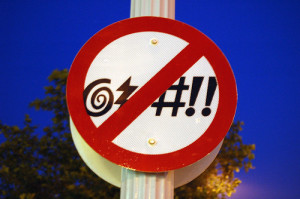 It seems, as of late that profanity is used excessively in schools without reservation. Students swear so comfortably, so often that they often pepper classroom responses with many four letter favorites. Maybe I have become old fashioned but the argument that the “f” word is a reasonable noun, verb, an adverb and an adjective has set me and my colleagues on edge. We devoted a full faculty meeting to this issue and I am now a member of the potty mouth committee. Yes, teachers form committees that become fodder for sitcoms. So what. Our mantra, borrowed from Maggie Smith’s Downton Abbey character reminds us that “Vulgarity is no substitute for wit.” Yet, conversing about language and etiquette made me realize that devoting time to the use of polite language could indeed be cause for some fun classroom banter and real learning.
It seems, as of late that profanity is used excessively in schools without reservation. Students swear so comfortably, so often that they often pepper classroom responses with many four letter favorites. Maybe I have become old fashioned but the argument that the “f” word is a reasonable noun, verb, an adverb and an adjective has set me and my colleagues on edge. We devoted a full faculty meeting to this issue and I am now a member of the potty mouth committee. Yes, teachers form committees that become fodder for sitcoms. So what. Our mantra, borrowed from Maggie Smith’s Downton Abbey character reminds us that “Vulgarity is no substitute for wit.” Yet, conversing about language and etiquette made me realize that devoting time to the use of polite language could indeed be cause for some fun classroom banter and real learning.
Students love studies in persuasion. In preparation for the atomic bomb debate, I found a graphic organizer to prep students for convincing arguments (readwritethink.org) and then I modeled an argument for curbing profanity. Piqued interest was high and follow up discussion was rich with opinion, counter argument and consensus on many clever substitutions for vulgarity. In fact, wit is a substitute for vulgarity.
Students agreed that the “f” word is overused. But what can be said to emphasize frustration, anger or tense or tension? “Forget you,” and “I reject you strongly” were considered but “shut the front door” was a favorite idiom. Students argued that WTF seemed conservative and acceptable. Fricking, fracking, Bolshevik! were also counted as acceptable on the swearing spectrum. “Cheese and Rice” is a common colloquialism that I was unaware of but I laughingly fell in love with the student suggested use of “shist.”
Perusing the Internet, we found this web link to the best cuss alternatives and voted as a class on several new favorites such as- Barbara Streisand! William Shatner! And “go lick a duck!”
Essentially students concluded that context and use determined whether or not substitution is acceptable. If someone is going to make the effort to consistently substitute profanity, wouldn’t it eventually be as annoying or offensive as actual swearing? I had to agree with their reasoning but I presented a rebuttal; when swearing is reserved for truly necessary moments and when we try to find humorous ways to express an idea, we invite more people of all ages into a communication. Being polite is an invitation to get to know someone. Swearing sends an alert or a message that one must be approached with caution. I do not know if students agreed with me because I am their teacher or if they hoped it would keep me quiet but it did lead one student to conclude that our school seemed to have issues with trust, and that there could be more that both teachers and students need to do to improve our environment. Engaging students in discussion might be a start.
I ended class with this question, what is gained, what is lost when students take risks to expand our vocabulary? What happens when we change the use of just one word? Using the color red as an example, we brainstormed variations on the color and then went right to Wikipedia. Common connotations and associations culturally throughout time triggered many student comments concerning feelings and emotions. Expanding vocabulary does give us greater opportunity to communicate nuances in how we feel. And it is nice to return comfortably to those moments when we simply need to use the color red or say exactly what we are thinking ….(expletive,@:(!)
* Another site I hope to share with students in return for their critique and feedback includes (Shakespearean insults )





The newest one for my middle school students is “Oh My Gina” or just “Gina” for short.
I once scolded a boy for using the f word in class & he & the other kids told me I was old fashioned & that’s the way kids talk nowdays. I told them THEY were old fashioned because that word first appeared in the 1500s and all they were doing was recycling someone else’s verbal trash. I told them that if they were so modern & hip, they should invent some new words that could not be related to, or derived from any form of the current crop of bad words, which , btw are also very old. No more profanity in that class! LOL !!
do you now the percentage
very helpful